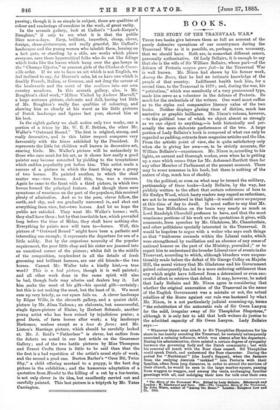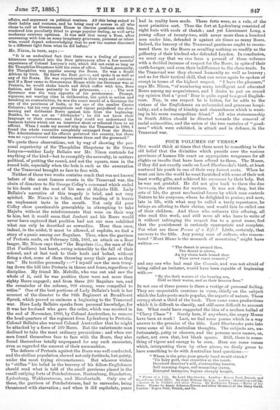BOOKS.
THE STORY OF THE TRANSVAAL WAR.* THESE two books give between them as fall an account of the
purely defensive operations of our countrymen daring the Transvaal War as it is possible, or, perhaps, even necessary, that we should have. Both are, in somewhat different senses, personally authoritative. Of Lady Bellaire, it is enough to say that she is the wife of Sir William Bellairs, whose part—of the defence of Pretoria magna pars fuit—in the Transvaal War is well known. Mr. Nixon had shown by his former work, Among the Boers, that he had an intimate knowledge of the people of that country. Indifferent health took him, for a second time, to the Transvaal in 1879; and, during the war, his "patriotism," which was manifestly of a very pronounced type, made him serve as a volunteer in the defence of Pretoria. So much for the credentials of the writers. One word must suffice as to the styles and comparative literary value of the two books. Neither displays glaring vices of diction, much less narrative or graphic brilliance. Mr. Nixon's volume, however, —to the political tone of which we object almost as strongly as we can object to anything,—is both historically and per sonally the more elaborate performance of the two. A large portion of Lady Bellairs's book is composed of what can only be regarded as padding, extracts from magazine articles and the like. From the artistic point of view, she is quite satisfactory only when she is giving her own—or, to be strictly accurate, Sir William Bellairs's—experiences. Mr. Nixon is, according to his lights, an earnest and thorough worker, even when he is getting up a case which seems fitter for Mr. Ashmead-Bartlett than for any other Member of Parliament at the present moment. There may be some nonsense in his book, but there is nothing of the nature of slop, much less of shoddy.
On the political, or even on what may be termed the military, partisanship of these books—Lady Bellaire, by the way, has pithlicly written to the effect that certain references of hers to Sir Evelyn Wood, which hasty readers may regard as reflections, are not to be considered in that light—it would serve no purpose at this time of day to dwell. It must suffice to say that Mr.
Nixon has Midlothian on the brain very nearly as much as Lord Randolph Churchill professes to have, and that the most wearisome portions of his work are the quotations it gives, with comments, from speeches by Mr. Gladstone, Mr. Chamberlain, and other politicians specially interested in the Transvaal. It would be hopeless to argue with a writer who says such things as that "traitorous counsels within the Liberal ranks, which were strengthened by vacillation and an absence of any sense of national honour on the part of the Ministry, prevailed ;" or to expect him to understand the broader Liberal view of events lathe Transvaal, according to which, although blunders were unques
tionably made before the defeat of Sir George Colley on Majuba Hill, the moral victory that Mr. Gladstone and his Government gained subsequently has led to a more enduring settlement than any which might have followed from a determined or even suc
cessful effort to retrieve that defeat. It may, however, be noted that Lady Bellaire and Mr. Nixon agree in considering that whether the original annexation of the Transvaal in the name of the English Government was a mistake or not, the actual rebellion of the Boers against our rule was hastened by what Mr. Nixon, in a not particularly judicial summing-up, terms "the substitution of the autocratic rule of Sir Owen Lanyon for the mild, irregular sway of Sir Theophilas Shepstone," although it is only fair to add that both writers do justice to the admitted capacity of Sir Owen Lanyon. Lady Bellaire says :—
" Whatever blame may attach to Sir Theophilus Shepstone or his share in too hastily annexing the Transvaal, be certainly subsequently exercised a calming infittenoe, which was absent after his departure. Duringhis administration, there existed a certain degree of sympathy between the governing body and the Dutch community ; but with his removal all touch with the Boer class ceased. Sir Theophilus could speak Dutch, and understood the Boer character. During the period for " Naehtmaal " (the Lord's Supper), when the farmers from the outlying disixicsts " trekked " into Pretoria with their families, often from long distances, in order to attend the services of their church, be would be seen in the large market-square, passing from waggon to waggon, and among the tents, exchanging familiar greetings with all, and indulging their love for talk over their own affairs, and argument on political matters. All this being suited to their habits and customs, and he being easy of access to all who chose to call at Government House to discuss questions with him, rendered him peculiarly fitted to gauge popular feeling, as well arto moderate extreme opinions. It was said that many a Boer, after conversing with him on some imaginary grievance, personal or otherwise' would depart acknowledging that he saw the matter discussed in adifferent light from what he did before."
Mr. Nixon, in turn, says :
"It is an undoubted fact that there was a feeling of personal bitterness imported into the Boer grievances after a few months' experience of Colonel Lanyon's rule, which did not exist so long as Sir Theophilus Shepstone held the reins of office. Indeed, personally, Sir Theophilus was popular among the Boers. He was a South African by birth. He knew the Boer patois, and spoke it as well as any of the Boers. He was experienced in their ways and customs ; and if a Boer came to Government House while the Governor was at Pretoria, he would shake hands and drink coffee with him Boer fashion, and listen patiently to his grievances The new Governor was the very opposite of his predecessor. Prompt, vigorous, not wasting time in deliberation, but quick in action and brooking no contradiction, he was the exact mould of a Governor for one of the provinces of India, or for one of the smaller Crown Colonies; but his very promptitude and vigour prejudiced the slow. moving and deliberate Boers against him from the beginning. Besides, he was not an Afrikander ' ; he did not know their language or their customs; and they could not understand the business habits which cut an interview short or referred them to an official. When I made my second trip into the Transvaal in 1880, I found the whole executive completely estranged from the Boers. The Administrator and his officers governed the country, but there was no rapprochement whatever between them and the governed."
We quote these observations, not by way of showing the personal superiority of Sir Theophilus Shepstone to Sir Owen Lanyon—neither Lady Bellairs nor Mr. Nixon contends for anything of the kind—but to exemplify the necessity, in matters political, of putting the round, and not the square, man in the round hole, especially when the hole is such as the annexation of the Transvaal brought us face to face with.
Neither of these two works contains much that was not known' before of the most famous events in the Transvaal war, the chain of disasters to Sir George Colley's command which ended in his death and the rout of his men at Majuba Hill. Lady Bellairs's narrative of this tragedy is brief, and not very spirited. Mr. Nixon's is fuller, and the reading of it leaves an unpleasant taste in the month. Not only did poor Colley show questionable generalship in attempting to take Majuba without the reinforcements that were on their way to him, but it would seem that Joubert and his Boers would never have captured that position had not our men exhibited what can only be described as cowardice. More than once, indeed, in the midst, it must be allowed, of exploits, we find a story of a panic among our Regulars. Thus, when the garrison of Pretoria made, on February 12th, 1881, an attack on a Boer laager, Mr. Nixon says that "the Regulars (i.e., the men of the 21st Fusiliers) lost heart, owing ostensibly to the fall of their colonel, and at last took to their heels and bolted, without firing a shot, some of them throwing away their guns as they ran." He testifies personally :—" I myself saw the men troop. ing down the hill into Pretoria in threes and fours, regardless of discipline. My friend Mr. Melville, who was out and saw the whole of it, said he was positive there were not more than eighty Boers engaged; and from these 200 Regulars ran, and the remainder of the column, 900 strong, were compelled to retire." One of the best portions of Lady Bellairs's book is her account of the disaster to the 94th Regiment at Bronkhorst Spruit, which proved so ominous a beginning to the Transvaal war. Here Lady Bellaire speaks from personal knowledge, for it was her husband who gave the order, which was received in the end of November, 1880, by Colonel Anstruther, to remove the head-quarters of the regiment from Lydenburg to Pretoria. Colonel Bellaire also warned Colonel Anstruther that he might be attacked by a force of 500 Boers. But the unfortunate man declined to take the most ordinary precautions ; and when our men found themselves face to face with the Boers, they also found themselves totally unprepared for any such encounter, even as regarded the amount of their ammunition.
The defence of Pretoria against the Boers was well conducted, and the civilian population showed not only fortitude, but gaiety, under the most trying circumstances. But whoever wishes to " stiffen " his belief in the bravery of his fellow-Englishmen should read what is told of the small garrisons placed in the small outlying forts of Potchefstroom, Rustenbitrg, Standerton, Lydenburg, Wakkerstroom, and Marabastadt. Only one of these, the garrison of Potchefstroom, had to surrender, being threatened with starvation ; and when it did capitulate, peace
had in reality been made. These forts were, as a rule, of the most primitive sort. Thus the fort at Lydenburg consisted of eight huts with roofs of thatch ; and yet Lieutenant Long, a young officer of twenty-two, with never more than a hundred men under him, defended it against six times as many Boers. Indeed, the bravery of the Transvaal garrisons ought to recommend them to the Boers as recalling nothing so readily as the gallantry of their kindred who defended Leyden. In conclusion, we must say that we rise from a perusal of these volumes with a decided increase of respect for the Boers, in spite of their earth-hunger, and even their indifference to the slave-trade. In the Transvaal war they showed humanity as well as bravery ; and as for their tactical skill, that can never again be spoken of except in terms of the highest respect. "I have the pleasure," says Mr. Nixon, "of numbering many intelligent and educated Boers among my acquaintance, and I desire to put on record. my opinion that a ' good ' Boer is quite equal to a good Englishman. Nay, in one respect he is better, for he adds to the virtues of the Englishman an unbounded and generous hospitality, and a feeling of kinship and clannishness which is wanting in his more cosmopolitan friend." All wise statesmanship in South Africa should be directed towards the removal of racial animosities, and the union of the two varieties of "goodness" which were exhibited, in attack and in defence, in the Transvaal war.



































 Previous page
Previous page